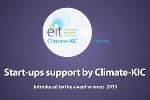MRV Sector
Challenge Platform: Greenhouse Gas Monitoring
Project Start Date: 05/2013
Lead partner: CDC Climat, France
Project type: Pathfinder - Explores relevant climate arenas to identify and prioritize innovation opportunities
Project lead: Valentin Bellassen, CDC Climat
Partners
This project involves 4 partners in 3 European countries:
- CDC Climat, France
- South Pole Carbon Asset Management, Switzerland
- National Physical Laboratory (NPL), UK
- Laboratoire des Sciences du Climat et de l’Environnement (LSCE), France
Concept
Greenhouse Gas (GHG) inventories are used by businesses, governments and members of the public as they provide levels of allowable carbon emissions and details of how emissions can be reduced. Some industrial sectors have high uncertainties in their Monitoring, Reporting and Verification (MRV) results which presents a barrier to carbon dioxide reductions.
MRV Sector aims to improve and increase the accuracy of monitoring techniques in order to facilitate climate change mitigation.
The climate change issue
The EU is one of the most significant locations for the creation of GHG inventories and carbon monitoring. The success of climate change mitigation strategies associated with GHG inventories is reliant on the accurate monitoring, reporting and verification (MRV) of greenhouse gas emissions (GHGs). However, low accuracy in MRV has the potential to jeopardise the emission reductions.
Poor accuracy in GHG monitoring can act as a barrier to reduction incentives. In several high emissions sectors, such as agriculture, forestry, and transport, MRV uncertainties can be greater than 50%. High costs and low accuracy in current MRV strategies prevent industries from realising the value of climate change mitigation.
The Project Solution
The MRV sector project is an innovative solution that attempts to link the carbon economy with the academic and industrial community developing new MRV technologies. It aims to identify innovative monitoring techniques to improve on existing ones or provide them where there is none. Its overall objective is to aid the realisation of the value of mitigation measures across sectors previously ignored due to inaccurate measuring methods.
The project will identify and quantify the accuracy and reliability of current MRV techniques based on a review of economic research on the issue. It will provide a comparative study of the benefits of existing methodologies with improved ones. This will include a cost/accuracy ratio for each procedure, an overview of the emissions levels, mitigation potential and the number of prospects engaged at each level of the carbon economy.
The role of Climate-KIC
Without Climate-KIC’s funding, the project wouldn’t have gone anywhere. But more valuable than anything is the network Climate-KIC provides. The choice of partners exemplifies the innovativeness of the project. CDC Climat Research and South Pole Carbon are experienced at operating within carbon markets, whilst LSCE and NPL are research institutes which contribute to developing innovative monitoring technologies.



